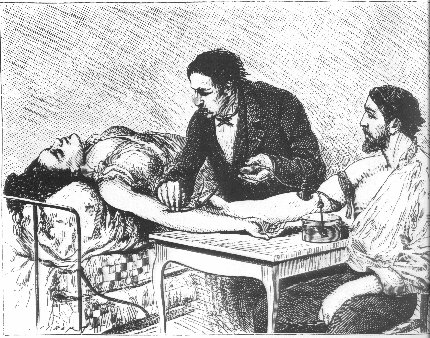While I was training in psychiatry 30 years ago, the field was changing around me. The older psychoanalysts were forced — reluctantly — to add prescription of psychotropics to their practices or else patients would never make it to their door. Of course, they had little to no training in pharmacology and less interest so they didn’t usually know what they were doing. While I was ascending in the ranks of psychiatric trainees, the best and the brightest of us were ushered into special training in pharmacology research. I was (and probably still am) about as idealist and apolitical an up-and-coming psychiatrist that anyone could have invented. Read more on The Politics of Drug Development…
Filed under politics, prescription drugs, Psychiatrists, Uncategorized by on May 20th, 2017. Comment. ![]()
I’ve got my outrage in motion and I’m blowing the whistle on one of the dirtiest tricks the big pharmaceutical companies play on us.
They have a technique called “Seeding Trials” that masquerade as drug testing (clinical trials) but are really nothing more than marketing surveys they can use to get around government regulations about promoting their drugs for alternative uses (also know as “off-label” uses).
But I’m printing this news in my private newsletter — not in my public blog.
The good news, you can read this for free. All you need to do is sign up for my free newsletter (that means “free of charge” as well as “Spam-Free”).
Just type your name and email address in that little box in the upper right hand corner of this page to opt-in. Of course, you can opt-out at any time also.
But I’m hoping that you find me so fascinating that you will continue to read.
The news I print in this blog is pretty general and the items in the newsletter are more personal and specific.
I think you will find it fascinating to see into the world of medicine, science, politics, government and even culture.
The newsletter will go out by email in a day or two … so please sign on now and take this journey with me. I promise to make it worth your time.
Take care and be happy!
Dr. G
Filed under Government, medicine, News, politics, prescription drugs by on Feb 27th, 2013. 1 Comment. ![]()
Topic: Research Fraud
For someone who has been a part of many clinical trials, I will be the first to admit that I have very little training in research design or statistics. Oh, the hours I’ve spent surreptitiously curled up on the sofa of a doctors’ lounge or my own apartment, thinking that somebody paid somebody a lot of money to write “science” so I could figure out how and why I would know things. It pretty much worked. There were a few mentions of statistics at my delightfully thorough prep school, but there was not so much as a word at medical school. The research types were always hanging around medical school settings — their brains rented and services bought by the medical side of things — as they did not make much money. We did receive some wonderful instruction from clinicians as to how to evaluate research literature and decide how to apply it to our practices.
I have a vivid memory of an endearing shy and spindly instructor during a course required for incipient biologists at Boston University. He had Jewish afro hair, coke bottle bottom glasses, and a more than passing resemblance to a young Woody Allen. Oh, how he despaired that we were mostly going to be money-chain doctors as opposed to truth-chasing scientists. I remember that once, and only once, did he reach fiery intensity in that class. “Nothing will be published unless the probability that it actually shows what it is supposed to show is greater than 19 out of 20, that means p>.05. But nobody wants to admit what that really means.” Oh, how silent we were, on the edge of our chairs. Read more on Research Fraud Isn’t Reported To The Public…
Filed under Government, Research by on Nov 14th, 2012. Comment. ![]()
Seventh grade science class at my prep school featured some basic knowledge and definitions that had to be memorized. I aced it, of course, but I don’t think anyone else even liked it.
 Over the course of my education (many, many years) I had a lot of science classes. And after I went to medical school, I was all scienced-up. Some of the classes were simply a waste of time – things required by law but not taken seriously by the school. Others were fascinating and formed my blossom love of science that led me to study medicine.
Over the course of my education (many, many years) I had a lot of science classes. And after I went to medical school, I was all scienced-up. Some of the classes were simply a waste of time – things required by law but not taken seriously by the school. Others were fascinating and formed my blossom love of science that led me to study medicine.
But I did get a lot of basics in that seventh grade class. Things like definitions. Words like “solute” and “solvent” held no mysteries for me. Water was, of course, the greatest solvent ever invented, but there were others. Like when we sent clothes to the dry cleaners, we had to remember the rhyme “Your best bet is carbon tet” a reference to carbon tetrachloride (CCl4). Funny little doggerel, I know, but it was even on the final test.
Carbon tetrachloride was not part of the chemistry of living things, so it is not terribly much of a surprise that I haven’t heard much about it until today. I also recognize the names of its close cousins; trichloroethylene and perchloroethylene.
Sure sounds as if carbon tet and some related solvents in paints and adhesives are related to Parkinson’s Disease.
Filed under Parkinson's Disease by on Nov 23rd, 2011. Comment. ![]()


